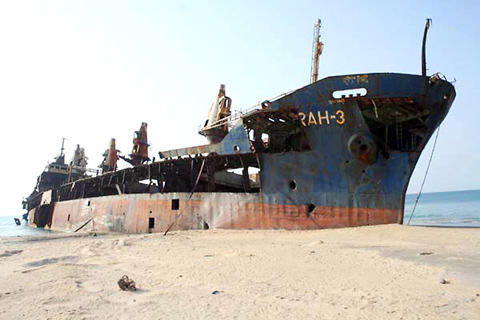Sri Lankan troops yesterday captured the last patch of coastline held by the Tamil Tigers, leaving the rebels completely surrounded and cut off from any sea escape, the military said.
The Sri Lankan government has vowed to press on to secure the final defeat of the Tigers despite international calls for a ceasefire to save the lives of thousands of trapped civilians.
In a new appeal to Sri Lankan authorities, EU foreign ministers said “the fighting must stop now.”

PHOTO: AFP
Two divisions of government soldiers that have been advancing along the coastline from the southern and northern ends of the rebel territory linked up yesterday morning, a military official said.
“The Tigers still have a few square kilometers of land, but not the use of the beach front,” he said.
President Mahinda Rajapakse has vowed to take the last territory from the Tigers by today, ending the separatists’ decades-long armed campaign for an ethnic Tamil homeland.
The Tigers controlled nearly one third of the island only two years ago, operating an effectively autonomous Tamil state.
Their defeat is unlikely to bring peace to Sri Lanka, instead seeing Tamil fighters return to the guerrilla hit-and-run tactics that they have used to devastating effect in the past.
Thousands of civilians continued to pour out of the rebel zone where they had been held by the Tigers in dire conditions.
“They are slowly giving up. They are blowing up whatever arms and ammunition they have,” military spokesman Brigadier Udaya Nanayakkara said of the remnants of the once-powerful Tamil Tiger army.
Tamil Tiger founder and leader Velupillai Prabhakaran is thought to be with his troops as they make a last stand.
UN Secretary General Ban Ki-moon’s chief of staff, Vijay Nambiar, was heading to Sri Lanka in a fresh effort to stop the carnage and was expected to reach Colombo late yesterday.
The UN’s human rights office has said an independent probe into war crimes in Sri Lanka was vital.
The International Committee of the Red Cross said staff were “witnessing an unimaginable humanitarian catastrophe.”

In the sweltering streets of Jakarta, buskers carry towering, hollow puppets and pass around a bucket for donations. Now, they fear becoming outlaws. City authorities said they would crack down on use of the sacred ondel-ondel puppets, which can stand as tall as a truck, and they are drafting legislation to remove what they view as a street nuisance. Performances featuring the puppets — originally used by Jakarta’s Betawi people to ward off evil spirits — would be allowed only at set events. The ban could leave many ondel-ondel buskers in Jakarta jobless. “I am confused and anxious. I fear getting raided or even

Kemal Ozdemir looked up at the bare peaks of Mount Cilo in Turkey’s Kurdish majority southeast. “There were glaciers 10 years ago,” he recalled under a cloudless sky. A mountain guide for 15 years, Ozdemir then turned toward the torrent carrying dozens of blocks of ice below a slope covered with grass and rocks — a sign of glacier loss being exacerbated by global warming. “You can see that there are quite a few pieces of glacier in the water right now ... the reason why the waterfalls flow lushly actually shows us how fast the ice is melting,” he said.

Eleven people, including a former minister, were arrested in Serbia on Friday over a train station disaster in which 16 people died. The concrete canopy of the newly renovated station in the northern city of Novi Sad collapsed on Nov. 1, 2024 in a disaster widely blamed on corruption and poor oversight. It sparked a wave of student-led protests and led to the resignation of then-Serbian prime minister Milos Vucevic and the fall of his government. The public prosecutor’s office in Novi Sad opened an investigation into the accident and deaths. In February, the public prosecutor’s office for organized crime opened another probe into

RISING RACISM: A Japanese group called on China to assure safety in the country, while the Chinese embassy in Tokyo urged action against a ‘surge in xenophobia’ A Japanese woman living in China was attacked and injured by a man in a subway station in Suzhou, China, Japanese media said, hours after two Chinese men were seriously injured in violence in Tokyo. The attacks on Thursday raised concern about xenophobic sentiment in China and Japan that have been blamed for assaults in both countries. It was the third attack involving Japanese living in China since last year. In the two previous cases in China, Chinese authorities have insisted they were isolated incidents. Japanese broadcaster NHK did not identify the woman injured in Suzhou by name, but, citing the Japanese